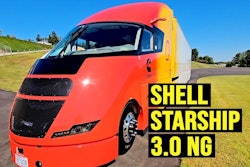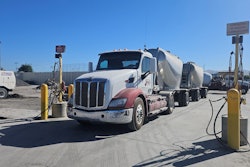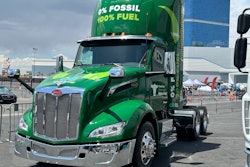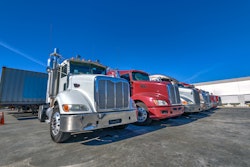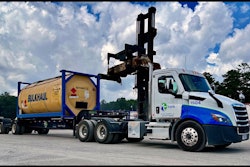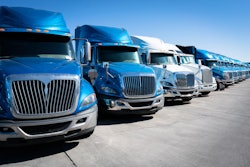Battery electric might very well be the way of the future (if not the distant future under the current presidential administration), but a report released by NGO Energy Vision found that renewable natural gas is the most suitable replacement for some of the oldest trucks on the highway.
The report, "A Path to a Healthier America: Ditching Old Diesel Trucks," focuses on replacing 130,000 heavy-duty diesel vehicles built before 2013 in 31 highly populated U.S. counties, including the 10 largest metro areas. Trucks of this age have some of the worst air emissions of all vehicles on U.S. roads, yet 2.4 million of them still operate nationwide.
Of the non-fossil fuel alternatives the report evaluated -- battery electric vehicles, new diesel models running on renewable diesel (RD) made from vegetable oils and animal fats, and compressed natural gas trucks running on renewable natural gas (RNG) made from organic wastes -- RNG was the overall winner.
"RNG is in the sweet spot for replacing the oldest, dirtiest diesel trucks," said report author Michael Lerner, Energy Vision's Research and Publications Director. "They cost far less than EVs, perform better, and can have the greatest climate benefits. In heavy transport, the smart money should be on RNG."
Electric trucks are by far the most expensive option for replacing diesel trucks, costing around $250,000 more. EV trucks have limited availability and haven't performed as well as diesels. While their tailpipe emissions are zero, much of their electricity still comes from fossil fuels. They also emit non-exhaust particulate pollution from tire and road wear.
The study found running newer, cleaner diesel engines on RD would yield 66% of the health benefits of switching to heavy-duty EVs, and up to 86% reduction in GHG emissions compared to fossil diesel -- without electric trucks' big upfront costs.
Compressed natural gas trucks running on RNG are widely used, perform as well as diesels, and have potentially the lowest lifecycle GHG emissions of any option. While they cost $35,000-$75,000 more than new diesels, that cost differential is more than offset by lower fuel costs. Replacing 130,000 old diesel trucks with new RNG models would deliver 88% of the health benefits of electric trucks, annually preventing over 100 deaths, 230 hospital ER visits, and 660 asthma cases, saving $2 billion in healthcare costs, the study found.
Contents of this video
00:00 10-44 intro
00:23 Electric truck mandates
00:56 Pre-2013 diesel trucks
02:59 Renewable diesel
05:19 Clean fuel standards
06:29 Renewable natural gas (RNG), Cummins X15N
08:44 Obstacles for electric trucking
Speaker 1:
Political upheaval has inserted a lot of uncertainty around zero emissions, and the big winners are reduced emission solutions. You're watching CCJs 10 44, a weekly episode that brings you the latest trucking industry news and updates from the editors of ccj. Don't forget to subscribe and hit the bell for notifications, so you'll never miss an installment of 10 44. Hey everybody, welcome back. I'm Jason Cannon, and my co-host, as always is Matt Cole. The Trump administration is taking a hard look at several federal and state regulations that were, in many cases electric truck mandates to one degree or another, but those trucks are expensive and really only play in small segments. And for the well-heeled operators, which generally tend to run newer and cleaner equipment to begin with, the
Speaker 2:
Biggest polluters on the highway are older Class eights trucks built before 2013, and a recent report from Energy Vision found that electrification wasn't the best way to clean up those trucks in the first place.
Speaker 3:
We looked at all the model years of trucks based on emissions factors and found that specifically the model years before 2013. So from 2012 and 11 and 10, all those before had way worse emissions of toxic air pollutants than all the subsequent models, and particularly those, essentially the oldest that they are the worst they are. And we're talking orders of magnitude above the modern engines in terms of nitrogen, oxides, particulate matter, all these kind of nasty things. So that was really an eyeopener and the target that it's not all trucks are created equal. There's a much more bang for the buck in terms of targeting these really old polluting trucks rather than just any across the board. So that focused in to what the problem was. So you don't have to replace every single truck, but these old ones in particular that you can make a big difference in air quality right away.
And that's kind of where we jumped into, alright, how do we do that? And we looked at three cleaner options, but all of them involve newer engines. So new models, it's not just replacing the fuel we're talking by default, a new model will be a lot cleaner than any of these older models, but there's upside. So renewable diesel can get you a certain higher amount, but renewable natural gas gets you even more electric if it were possible, gets you even higher. But that's a whole nother can of worms. We can discuss further. So we're talking about permanently retiring these older trucks. So it's not just taking an older truck, for example, and putting in renewable diesel rather than fossil diesel. We're talking about how to get these old trucks permanently off the roads and scraps not sold into less regulated markets abroad, but just off the roads. And so we looked at how to actually go about doing that with the cost of a new diesel model or new compressed natural gas or new electric.
Speaker 1:
As Michael said, electrification is the biggest opportunity in clean emissions, but we seem to be many development cycles away from making mass adoption realistic. The other options he mentioned specifically renewable diesel have challenges as well, despite it being the single easiest drop in solution for motor carriers to implement.
Speaker 3:
The supply is not fully there and it's not geographically as well distributed. However, we think that the capacity is certainly there for it to be a feasible option, at least in replacing these 130,000 heavy duty duty trucks that we modeled in this report. You could get 66% of the health benefits that go into full blown electric would, and I think that's pretty compelling from a public health standpoint because new diesels are available. And for fleets that have to replace anyways, just outdated assets. That's something that can get you significant public health savings right off the bat, and not just society at large, but also the drivers and workers who maintain these trucks. But the bottom line is that if we replace all those 130,000 vehicles old diesel trucks with new models running on renewable diesel, it would save about one and a half billion dollars per year in annual public health costs avoided.
That's about 66%, two thirds of what electrics could do. Were electrics available to replace all those 130,000, which they are not even close today. We were careful to specify renewable diesel because it can fully replace petroleum diesel in all uses. Biodiesel generally can only do five to 20%, and in theory, they've done testing that 50% or more. They start getting all kinds of chemical problems with the actual combustion and usage. So biodiesel is more of a drop in and it can't fully replace petroleum diesel. So plus they're actually certain higher air toxins emitted from biodiesel usage. So we excluded that. We just focused on renewable diesel because that is a far cleaner, more sustainable, and it can fully replace fossil fuels fossil diesel in this case. And we're looking at non-fossil fuel options for these trucks.
Speaker 2:
Renewable diesel has a few advantages in how easy it is for fleets to implement. One, you don't need a special engine or anything else, just fill up and drive away. Two, once subsidies are in play, renewable diesel can be cheaper than regular diesel.
Speaker 3:
One of the key factors are clean fuel standards in different markets, especially California or Oregon, Washington, that that's really what's driven renewable diesel usage. And it's one of the things that we put as our policy recommendations to accelerate any of these clean fuel options, is that it will incentivize the use of renewable diesel, renewable natural gas, electricity, all things that are non-fossil fuels. And that's why in California, renewable diesel has grown by leaps and bounds and will soon overtake all petroleum diesel usage there very quickly. And that really California stood out from the pack there. So any other states that are mulling over a clean fuel standard can see exactly what that will lead to, which is the phasing out of petroleum diesel, which we're all in favor of. I mean, that itself is a worthy goal.
Speaker 1:
Now, you can't have an alternative fuel conversation without mentioning natural gas, which is seeing a resurgence of interest industry-wide
Speaker 3:
And RNG, for example, renewable natural gas. That was kind of the sweet spot where it's, you get about 2 billion in annual health savings on a public health basis and only a slight premium over new diesel models, but they are widely available in high performing, unlike the electric option, which is largely theoretical at this stage, renewable natural gas is actually the overall winner in terms of best replacement for these old diesel trucks based on multiple factors on emissions reductions, on cost, on performance, and on availability. So a couple interesting facts that we've been noticing is that the percentage of RNG as comprises the whole of natural gas used in the transportation sector is rising quickly. It's already going to be past 80% as of last year, and that's pretty enormous. That means of all natural gas used in transportation sector across the country, the overwhelming majority is already RNG.
Now, a lot of that is from high use fleets. So it's not to say every single natural gas vehicle is running on RNG, but the proportion is definitely rising. And we even include the numbers of refueling stations across the country that are dispensing entirely RNG. So one of the main takeaways is that RNG is a real option, and it's growing. It's not a niche thing, it's not something that is a footnote to the sector. We see it growing significantly. And another key finding is that the Cummins 15 liter engine has really opened up the long haul tractor trailer market for renewable natural gas RNG, delivered emissions, air pollutant emissions reductions that were very high, almost as good as the electric emissions reductions. We found them 88% of the health benefits compared to this idealized scenario of full electric adoption in the heavy duty sector. And yet, RNG costs a fraction of electrics and is available now,
Speaker 2:
According to Cal start, less than 1800 heavy duty electric trucks were deployed from 2017 to mid last year. Compare that to more than 5 million class seven and eight trucks in the same period. And the political climate for electrification, at least for right now, is going to be another obstacle in electric trucking.
Speaker 3:
The transition to what a lot of people expect, a transition to electric in the heavy duty sector may happen, but it's going to take a lot longer than anyone has hoped for or anticipated. And so we wrote this report over the course of last year and through these first couple months where, yeah, change of administration and total lack of support for anything to do with electric, it only confirms the main message that we had been saying that electric is not a feasible option today or in the very near future for replacing these old diesel trucks at any scale, let alone 130,000 of these vehicles. So yeah, it's not really surprising that the lack of deployments or the lack of charging infrastructure is going to be an impediment that was always going to be an impediment. It's now even more pronounced. The delays are greater and this healthy skepticism about the whole feasibility of it if federal subsidies are taken out or these larger programs.
So it doesn't really change any of the report findings. It was, as I was saying, electric. It was more of a comparative option, but not a feasible one. And so as we noted, the policies are changing and costs are changing also very dramatically. So you can't even really calculate what the impact is going to be when suddenly the rules are off the board and no one knows what they're going to cost or what the deployment might look like and add to that. Now, the stalled progress on building charging stations and that whole chicken and egg situation without the charging stations, doesn't matter what the costs of the vehicles are, if you have no place to charge them, there's stranded assets. That was a whole big thing of in the report, able to use existing infrastructure is a key consideration. At the end of the day, this trucking segment, which is so important for the economy, needs to be able to reliably perform.
They need to be able to get to their destinations efficiently on time, not stranded by the road and nowhere to charge or taking multiple hours. The operations need to work smoothly, and so that's why we really focus on commercially available options today. The future is a whole nother thing that no one really knows. But yeah, the trends for electric right now are not that promising in the near term at least. I mean, there's a lot of research and development, but again, without charging stations being built up simultaneously, it's just going to push that transition that much further.
Speaker 1:
That's it for this week's 10 44. You can read more on ccj digital.com. While you're there, sign up for our newsletter and stay up to date on the latest in trucking industry news and trends. If you have any questions or feedback, please let us know in the comments below. Don't forget to subscribe and hit the bell for notifications so you can catch us again next week.




